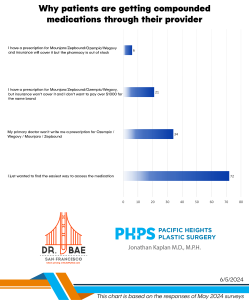The medications you’ve been hearing so much about are just shy of miraculous. And that’s not hyperbole. These medications have all of the positives of effective weight loss meds (they help you lose weight!) without the worse possible side effects (heart valve dysfunction with Fen-Phen in the ’90’s or the side effects associated with amphetamines) and can be taken as long as needed to get to your goal weight.
GLP-1s weight loss medications
We’re talking about the glucagon like peptide-1 receptor agonists or GLP-1s for short. While this class of medications has been around for over 20 years, you’re just hearing about Ozempic (semaglutide) FDA-approved for type 2 diabetes in 2017, Wegovy (semaglutide) FDA-approved for weight loss in 2021 and Mounjaro (tirzepatide) FDA-approved for type 2 diabetes and for obesity by the end of 2023. The reason you’re just hearing about these medications even though other name brands within this class also contributed to weight loss over the last 20 years, is because these newer medications are weekly rather than daily injections.
The medications enhance secretion of insulin from the pancreas which drives sugar into the cells to be used for energy. This is why these medications were first used to treat type 2 diabetes, the form of diabetes mostly associated with overweight and obesity. During study trials and in the real world, they were also found to be highly effective at appetite suppression and weight loss.
Despite the amazing weight loss and relatively good safety profile compared to weight loss meds that came before it, the media is always looking for a chink in the armor. Success apparently doesn’t generate as many clicks as scandal. And that’s why the media often highlights side effects associated with Ozempic even though these are side effects we’ve known about for over 20 years.
Success apparently doesn’t generate as many clicks as scandal.
And they often attach a clever name to the side effect to capture more eyes. Below we’ll review the main “complications” of these medications even though they’re really known side effects that, in some cases, are features of the medication, not a bug.
Stomach paralysis
This is just a scarier term for delayed gastric emptying. One way these medications help you lose weight is through delayed gastric emptying, meaning food moves more slowly from the stomach to the intestine. This results in a feeling of fullness so the patient eats less and loses weight.
Ileus
This is similar to delayed gastric emptying. These medications affect and slow motility or movement throughout the entire gastrointestinal track. This could lead to ileus, a slowing of the intestines so food stops moving forward and in the worse of circumstances leads to a bowel blockage. But that’s not common. What’s more common are the other GI side effects like nausea, vomiting, diarrhea or constipation. All treatable ailments if they occur and one option is to switch to tirzepatide which has fewer side effects compared to semaglutide as seen in independent studies below.




Pancreatitis
Also a known rare side effect. These medications, even when approved for type 2 diabetes work to stimulate or enhance insulin secretion from a “burned out” pancreas in a type 2 diabetic state. They work for weight loss by stimulating the pancreas to release insulin which contributes to a feeling of satiety (less hungry, eat less). Out of 2,116 patients studied in the Wegovy trial that was ultimately submitted to the FDA for approval, 4 patients taking the active ingredient semaglutide and 1 patient taking the placebo or inactive ingredient for comparison had pancreatitis. So the risk isn’t high in developing pancreatitis in general, but can still occur, even in a patient not taking the medication (placebo)!
Medullary thyroid cancer
When these medications were first being studied on lab rats in the lab, some rats contracted a rare form of thyroid cancer, medullary thyroid cancer. But even some of the rats taking the placebo, the nonactive medication, developed medullary thyroid cancer. So it’s not clear what that association is and the FDA even states they’re not sure of the significance in humans. Even though the incidence of medullary thyroid cancer in humans has been rare and unchanged for the last 30+ years despite these medications being available on the market for human use since 2005, we still recommend our patients examine the middle of their neck to ensure there are no lumps and bumps around the neck that weren’t there the month before.
Suicidal ideations
There is a risk of suicide with all weight loss medications. This isn’t specific to Ozempic, Wegovy or Mounjaro. It’s not clear yet what the association is, possibly pre-existing depression, but patients on weight loss medications are known to consider suicide. There’s no evidence this is specific to or worse for patients on Ozempic or Wegovy. But the drug manufacturer isn’t attempting to hide this. It was in the FDA application for approval.
This won’t be all. The media will look at other side effects and act like they’re new or riskier than they are. For the next trending risk, my money is on alopecia. 3% of patients taking the medication had some alopecia but the placebo group still had 1% incidence of alopecia. This isn’t specific to the medication. Any stressor, like weight loss, can lead to hair loss. It’s called telogen effluvium.
Nothing new here.
Click here for the original blog post written by Dr. Jonathan Kaplan for BuildMyHealth.




